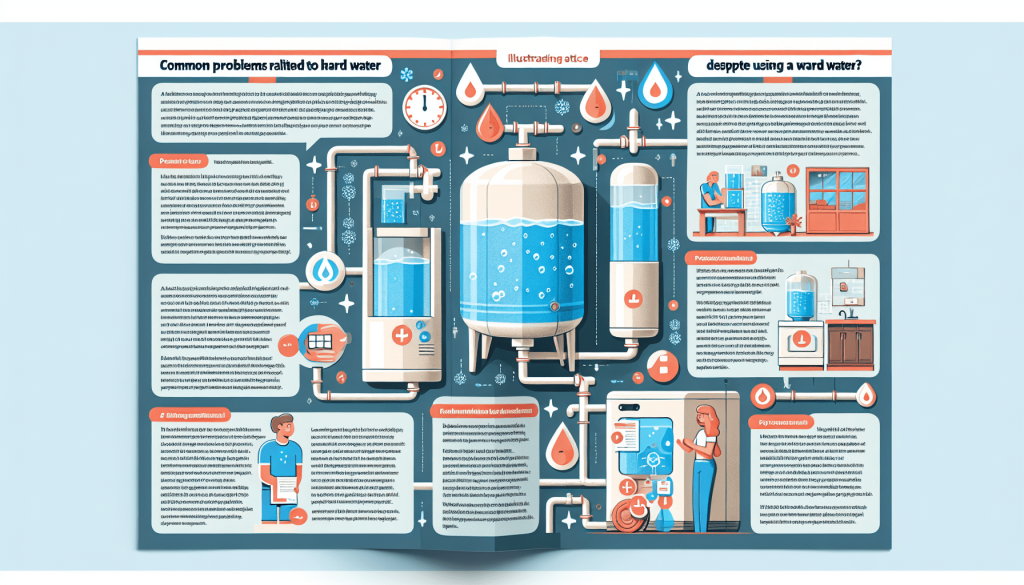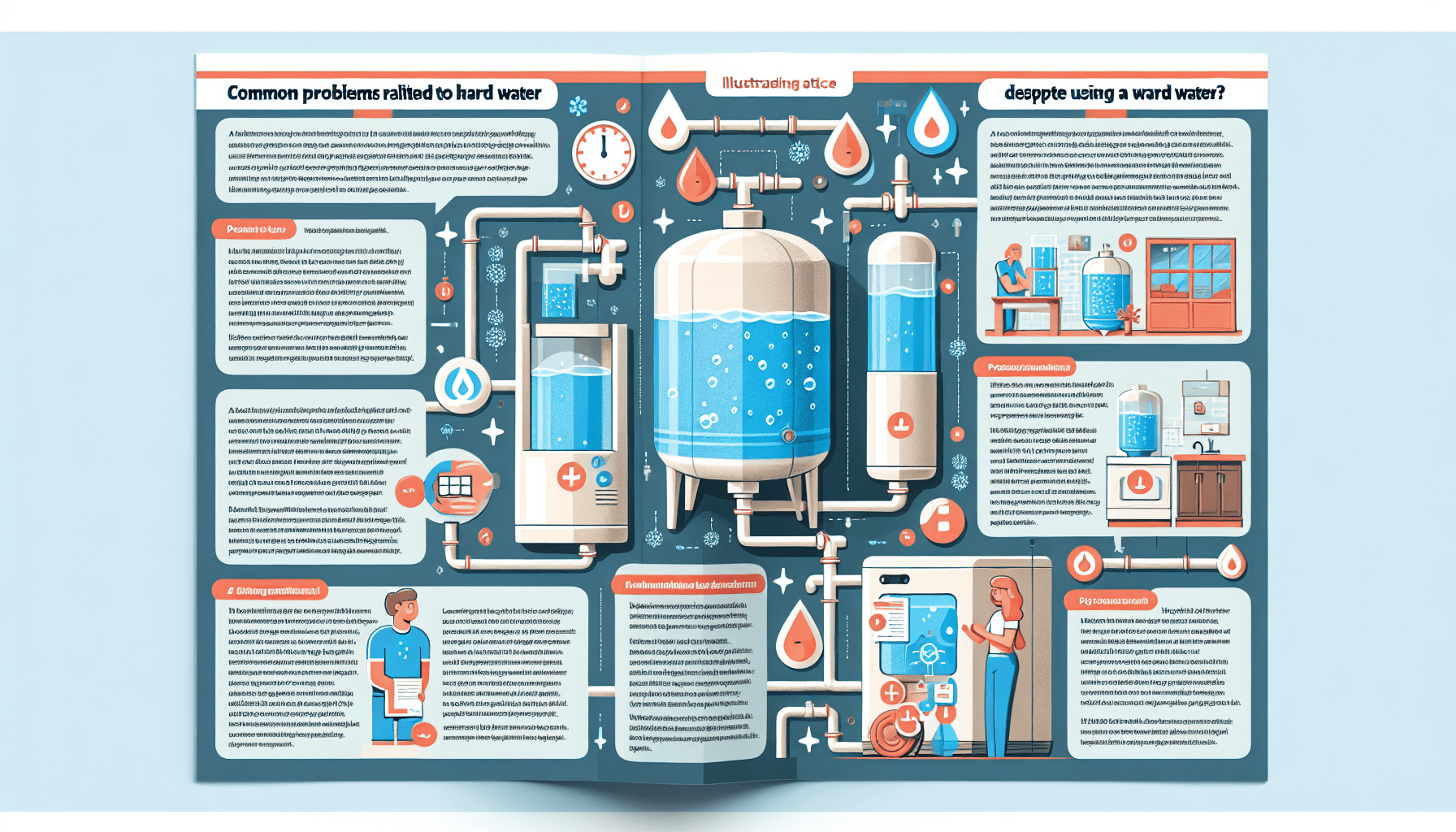Are you frustrated with the lingering presence of hard water despite investing in a water softener? You’re not alone. It can be disheartening to discover that your water softener may not be delivering the expected results. But fear not, as this article aims to shed light on the possible reasons behind this phenomenon. With a friendly tone and helpful insights, we’ll explore the potential culprits that could be preventing your water softener from truly achieving its intended purpose. So, let’s dive in and uncover why you may still have hard water despite using a water softener.
Understanding Water Softeners
Water softeners are devices used to remove minerals, such as calcium and magnesium, from hard water. The process of water softening involves exchanging these minerals with sodium or potassium ions, resulting in softened water. But how exactly do water softeners work? Let’s delve into the topic.
How Do Water Softeners Work?
Water softeners work through a process called ion exchange. The main component of a water softener is a resin bed, which contains small beads coated with sodium or potassium ions. As hard water passes through the resin bed, the calcium and magnesium ions are attracted to the resin beads and are exchanged for sodium or potassium ions. This exchange effectively softens the water, making it free from the minerals that cause hardness.
What Are the Components of a Water Softener?
A typical water softener system consists of several components. These include a resin tank, brine tank, control valve, and bypass valve. The resin tank is where the ion exchange process takes place, while the brine tank holds the salt used to regenerate the resin. The control valve regulates the flow of water through the system, and the bypass valve allows water to be diverted around the softener if needed.
What Are the Benefits of Using a Water Softener?
Using a water softener offers numerous benefits. Firstly, softened water can prevent scale buildup in pipes, appliances, and fixtures. This helps to prolong their lifespan and improve efficiency. Softened water also reduces soap scum and improves the effectiveness of soaps and detergents, leading to cleaner and brighter clothes, dishes, and surfaces. Additionally, soft water can leave your skin and hair feeling smoother and more hydrated after bathing or showering.
What Is Hard Water?
Hard water refers to water that contains a high concentration of dissolved minerals, primarily calcium and magnesium. This hardness can create various issues, such as mineral deposits on fixtures and appliances, reduced soap lathering and cleaning efficiency, and dry skin and hair. Hard water can also cause scaling in pipes, leading to reduced water flow and efficiency in heating systems.
Potential Causes for Hard Water Despite Using a Water Softener
So, why do you still have hard water even though you are using a water softener? Several factors may contribute to this issue. Let’s explore some potential causes:
Incorrect Sizing of the Water Softener
One possible cause is that your water softener is not properly sized for your household’s needs. If the water softener is too small, it may not be able to adequately remove the minerals from the water, resulting in continued hardness issues.
Improper Installation
Another factor to consider is the installation of the water softener. If the system is not installed correctly, it may not be functioning optimally, leading to inefficient removal of minerals from the water.
Malfunctioning Components in the Water Softener
Sometimes, the softener may have malfunctioning or worn-out components, such as the control valve or resin bed. These faulty parts can hinder the effectiveness of the water softener, allowing minerals to remain in the water.
Insufficient Regeneration
The regeneration process is essential for maintaining the efficiency of a water softener. If the system is not regenerating properly, it may not be able to effectively remove the minerals from the resin bed, resulting in hard water.
Water Source has High Mineral Content
Lastly, it is possible that the water source itself has an unusually high mineral content. In such cases, the water softener may struggle to remove all the minerals, leading to residual hardness.

Determining the Cause
To address the issue of hard water despite using a water softener, it is crucial to determine the cause. Here are some steps you can take to identify the underlying problem:
Check the Water Softener’s Sizing
Start by evaluating whether your water softener is properly sized for your household’s water usage. Consult the manufacturer’s guidelines or seek professional advice if necessary. If the softener is undersized, consider upgrading to a larger unit.
Inspect the Installation
Inspect the water softener system’s installation to ensure it was done correctly. Look out for any obvious errors or misconnections that may be impairing the system’s functionality. If unsure, consult with a professional plumber or water treatment specialist.
Examine the Water Softener Components
Carefully examine the various components of the water softener for any signs of damage or malfunctioning. This includes inspecting the control valve, resin bed, brine tank, and bypass valve. Replace or repair any faulty parts as needed.
Evaluate the Regeneration Process
Monitor the regeneration process of your water softener. Ensure it is set to regenerate at appropriate intervals and that the regeneration cycle is functioning correctly. Adjust the frequency if necessary to ensure effective mineral removal.
Test the Mineral Content of the Water Source
Have your water source tested to determine the exact mineral content. This will help you assess whether the hardness issue originates from the high mineral content of the source water or if there are other contributing factors.
Solutions to Address the Issue
Once you have identified the cause of your hard water problem, you can take appropriate measures to resolve it. Here are some possible solutions:
Resizing the Water Softener
If the cause of the hard water is an undersized water softener, consider upgrading to a larger unit that can accommodate your household’s needs. This will ensure more effective mineral removal and provide you with softened water consistently.
Correcting Installation Errors
Address any installation errors by seeking professional assistance. A trained plumber or water treatment specialist can identify and rectify any issues, ensuring the system operates optimally.
Repairing or Replacing Malfunctioning Components
Replace or repair any malfunctioning components in the water softener system. Faulty parts like the control valve or resin bed can be replaced, restoring the efficiency of the softener.
Adjusting the Regeneration Frequency
Experiment with adjusting the regeneration frequency of your water softener. Increasing or decreasing the frequency may help optimize the mineral removal process, improving overall water softening effectiveness.
Considering Alternate Water Softening Methods
If all else fails or the issues persist, consider exploring alternative water softening methods, such as salt-free systems or electronic water conditioners. These alternative approaches can provide effective water softening without the use of salt or chemicals.

Consulting a Professional
If you are experiencing persistent hard water despite your efforts, it may be time to consult a professional. Here are some steps to consider:
Seeking Advice from a Water Treatment Specialist
Reach out to a water treatment specialist who can assess your specific situation and provide expert guidance on resolving your hard water issues. They can evaluate your water quality, identify the underlying causes, and recommend appropriate solutions.
Getting a Water Analysis Done
Consider getting a comprehensive water analysis done to determine the precise mineral content and identify any additional contaminants. This analysis can provide valuable insights into your water quality and guide you in finding the most suitable treatment options.
Exploring Advanced Treatment Options
For complex water issues or specific requirements, advanced treatment options may be necessary. These can include specialized filters, reverse osmosis systems, or other advanced technologies that target specific contaminants and provide tailored solutions.
Common Misconceptions about Water Softeners
It’s important to dispel some common misconceptions about water softeners. Here are a few:
Water Softeners Eliminate All Minerals
Contrary to popular belief, water softeners do not remove all minerals from the water. While they effectively remove calcium and magnesium, small amounts of other minerals may still be present.
Water Softeners Remove All Scale and Staining
Although water softeners significantly reduce scale buildup and staining, they may not eliminate it entirely. Existing scale may require additional cleaning, and in certain cases, other water treatment methods may be necessary to address specific staining issues.
Water Softeners Change the Taste of Water
Water softeners do not alter the taste of water significantly. While some individuals may notice a difference, the impact on taste is generally minimal. Softened water remains safe and enjoyable to drink.

Prevention and Maintenance Tips
To ensure optimal performance and longevity of your water softener, consider the following prevention and maintenance tips:
Regularly Maintain and Clean the Water Softener
Follow the manufacturer’s guidelines for regular maintenance and cleaning. This may include flushing the resin bed, cleaning the brine tank, and inspecting and lubricating moving parts.
Consider Using a Water Filter
Pairing your water softener with a water filter can help remove additional impurities, such as sediment or chlorine. This combined approach ensures cleaner and better-tasting water.
Use Water Softener Salt Properly
Choose the right type of salt recommended by your water softener manufacturer. Follow guidelines on salt usage and avoid using excessive amounts, as this can affect the system’s efficiency.
Monitor Water Softener Performance Regularly
Keep an eye on the performance of your water softener. Check for any signs of reduced effectiveness, unusual noises, or changes in water quality. Regular monitoring allows you to detect and address issues promptly.
Additional Factors to Consider
In addition to the main causes and solutions discussed, there are several other factors to consider when dealing with water softeners and hard water:
Water Softener Age and Condition
The age and overall condition of your water softener can impact its performance. Older systems may have worn-out components that compromise their efficiency, while newer models tend to be more advanced in their technology and effectiveness.
Water Usage Patterns and Needs
Assess your household’s water usage patterns and needs to ensure your water softener is appropriately sized. Consider factors such as the number of occupants, daily water consumption, and specific requirements for different appliances or fixtures.
Quality of Water Treatment Products
Not all water treatment products are created equal. Choose reputable brands and quality products when purchasing water softeners, replacement parts, salt, and other related items. This ensures better performance and longevity of the system.
Environmental Factors Affecting Water Hardness
Keep in mind that external environmental factors can influence water hardness. Changes in the water source, such as seasonal variations or nearby construction activities, may impact the mineral content. Stay aware of these factors to understand any changes in water quality.

Conclusion
Identifying the cause for hard water despite using a water softener is the first step towards finding a solution. Through careful evaluation of the system’s sizing, installation, performance, and the water source itself, you can determine any underlying issues that may be contributing to hardness. From there, appropriate actions can be taken such as resizing the softener, repairing components, or exploring alternative treatment methods. Remember to consult with professionals for expert advice, undertake regular maintenance, and monitor your water softener’s performance to ensure optimal results. With the right measures in place, you can enjoy the benefits of consistently softened water and tackle hard water challenges effectively.


